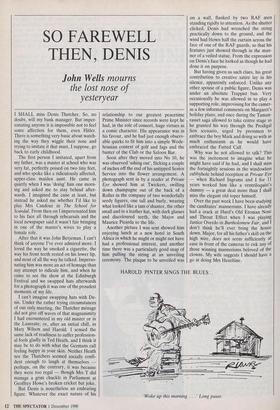SO FAREWELL THEN, DENIS
John Wells mourns
the lost nose of yesteryear
I SHALL miss Denis Thatcher. So, no doubt, will my bank manager. But imper- sonating anyone it is impossible not to feel some affection for them, even Hitler. There is something very basic about watch- ing the way they wiggle their nose and trying to imitate it that must, I suppose, go back to early childhood.
The first person I imitated, apart from my father, was a master at school who was very fat, perfectly poised on two tiny feet, and who spoke like a ridiculously affected, upper-class maiden aunt. He came in quietly when I was 'doing' him one morn- ing and asked me to stay behind after- wards. I imagined the cane at least, but instead he asked me whether I'd like to play Mrs Candour in The School for Scandal. From then on I impersonated him to his face all through rehearsals and the local newspaper said it wasn't fair bringing in one of the master's wives to play a female role.
After that it was John Betjeman. I can't think of anyone I've ever admired more: I loved the way he smoked a cigarette, the way his front teeth rested on his lower lip, and most of all the way he talked. Imperso- nating him was more an act of homage than any attempt to ridicule him, and when he came to see the show at the Edinburgh Festival and we swapped hats afterwards for a photograph it was one of the proudest moments of my life.
I can't imagine swapping hats with De- nis. Under the rather trying circumstances of our only meeting, the Thatcher ménage did not give off waves of that magnanimity I had encountered in my old master or in the Laureate; or, after an initial chill, in Mary Wilson and Harold. I sensed the same lack of readiness to suffer profession- al fools gladly in Ted Heath, and I think it may be to do with what the Germans call feeling happy in your skin. Neither Heath nor the Thatchers seemed socially confi- dent enough to laugh at themselves perhaps, on the contrary, it was because they were too regal — though Mrs T did manage a grim chuckle in Parliament at Geoffrey Howe's broken cricket bat joke.
But Denis is nonetheless an endearing figure. Whatever the exact nature of his relationship to our greatest peacetime Prime Minister since records were kept he had, in the role of consort, huge virtues as a comic character. His appearance was in his favour, and he had just enough observ- able quirks to fit him into a simple Wode- housian context of golf and fags and the banter of the Club or the Saloon Bar.
Soon after they moved into No 10, he was observed `ashing out', flicking a couple of inches off the end of his untipped Senior Service into the flower arrangement. A photograph sent in by a reader at Private Eye showed him at Twickers, swilling down champagne out of the back of a Roller in the company of two wonderfully seedy figures, one tall and burly, wearing what looked like a tam o'shanter, the other small and in a leather hat, with dark glasses and discoloured teeth, the Major and Maurice Picarda to the life.
Another picture I was sent showed him enjoying lunch at a new hotel in South Africa in which he might or might not have had a professional interest, and another time there was a particularly good snap of him pulling the string at an unveiling ceremony. The plaque to be unveiled was on a wall, flanked by two RAF men standing rigidly to attention. As the shutter clicked, Denis had wrenched the string practically down to the ground, and the wind had blown half the curtain across the face of one of the RAF guards, so that his features just showed through in the man- ner of a veiled statue. From the expression on Denis's face he looked as though he had done it on purpose.
But having given us such clues, his great contribution to creative satire lay in his silence, apparently enforced. Unlike any other spouse of a public figure, Denis was under an absolute Trappist ban. Very occasionally he was allowed in to play a supporting role, improvising for the camer- as a few informal comments on Margaret's holiday plans; and once during the Taman- rasset saga allowed to take centre stage as he grunted his way through the Prodigal Son scenario, urged by pressmen to embrace the boy Mark and doing so with as much enthusiasm as he would have embraced the Fatted Calf.
Why was he not allowed to talk? This was the incitement to imagine what he might have said if he had, and I shall miss the fortnightly sessions in the windowless cubbyhole behind reception at Private Eye — when Richard Ingrains and I for 11 years worked him like a ventriloquist's dummy — a great deal more than I shall miss the elegant old toper himself.
Over the past week I have been studying the canditates' mannerisms. I have already had a crack at Hurd's Old Etonian Nose and Throat Effect when I was playing Justice Overdo in Bartholomew Fair, and I don't think he'll ever bring the house down. Major, for all his father's skill on the high wire, does not seem sufficiently at ease in front of the cameras to risk any of those winning mannerisms beloved of the clowns. My wife suggests I should have a go at doing Mrs Heseltine.
HAROLD PINTER SINGS THE BLUES ..
`Woke up this morning . .' Long pause.










































































 Previous page
Previous page